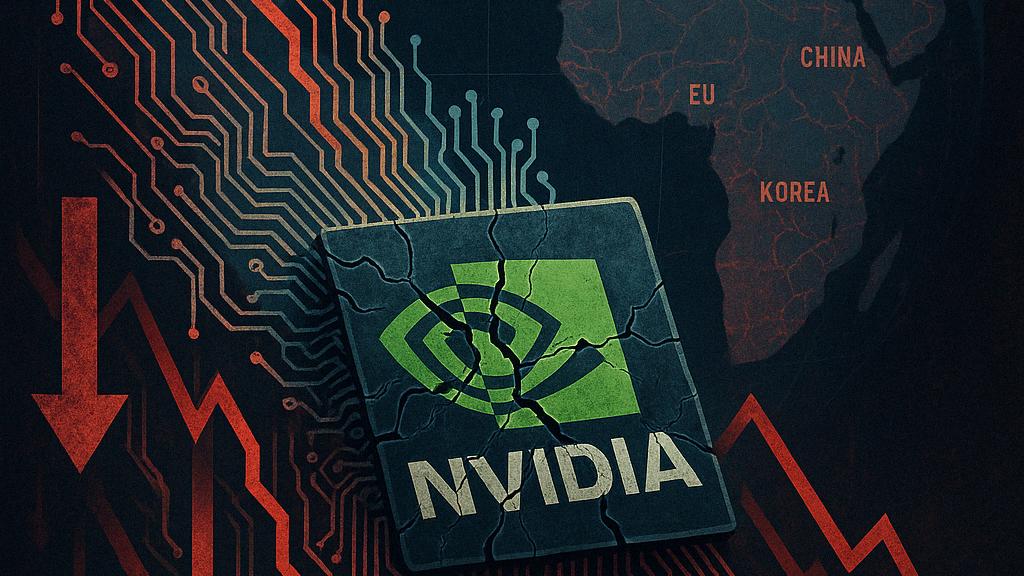
The stock market today felt the pinch as investors stepped back from technology companies. Nvidia, a heavyweight in semiconductor manufacturing, triggered the sell-off after announcing setbacks tied to new trade restrictions placed on chip exports to China.
Licensing Rules Hit Nvidia’s China Business
The Trump administration’s recent measures require Nvidia—a leader in AI technology—to obtain an official license before selling advanced semiconductor chips in China. This unexpected move marks the administration’s first significant restriction targeting semiconductor trade directly. As a result, Nvidia’s efforts to benefit from China’s booming AI market face notable challenges.
Nvidia Faces Major Financial Impact
Nvidia disclosed to regulators a potential $5.5 billion loss tied to unsold inventory and canceled orders from China. NVDA stock price today reflected the negative sentiment, declining 6 percent during after-hours trading. Investor anxiety was evident as the Nasdaq NVDA sector weakened significantly due to this development.
European Markets Also Feeling the Heat
In response, European markets also showed discomfort, particularly semiconductor manufacturer ASML, whose shares dropped by 6 percent. The company highlighted pressures generated by U.S. tariffs and intensified trade conflicts, creating uncertainty around future orders and revenues.
Increased Global Market Volatility
The MSCI World Index data for 2025 already indicates higher volatility, with a standard deviation reaching 15 percent from 12 percent the previous year. Effects from the current trade restrictions further spooked markets worldwide. For instance, Asian markets showed declines between 1 to 2 percent, with Taiwan Semiconductor Manufacturing Company (TSMC)—a key Nvidia supplier—falling 2.5 percent. Samsung and SK Hynix, South Korea’s chip giants, also recorded over 3 percent losses.
Wall Street Futures Point to Losses
Dow Jones Industrial Average futures and S&P 500 futures highlighted investor caution, with both indicating more than a 1 percent drop during premarket trading. Though positive earnings from major U.S. banks and progress in trade negotiations between the U.S. and the UK provided minor optimism, investor nervousness primarily overshadowed stock market sentiment.
Investors Move Away from U.S. Stocks
Institutional investors are also signaling concern. A 2025 PwC survey found that approximately 60 percent have pared down their investments in U.S. stock markets due to fears of escalating trade disputes. Instead, they are shifting strategy to emerging markets and industries likely to be less impacted by global trade tensions.
IMF and Gartner Reports Highlight Real Risks
Data from the International Monetary Fund’s 2025 global forecast projects overall economic growth at 3.5 percent. But the continued U.S.-China tensions remain a significant risk factor impacting investor confidence. Furthermore, Gartner’s technology sector report shows global tech revenues have decreased by 4.2 percent compared to the previous year, largely due to disrupted supply chains from continued trade friction.
Semiconductor Sector Under Pressure
Nvidia’s difficulties mirror the broader downturn in the semiconductor market. The Semiconductor Industry Association reported a notable 7 percent drop in global semiconductor sales for 2025’s first quarter, pinpointing trade restrictions as a leading factor. Many semiconductor companies face similar challenges from geopolitical pressures, influencing stock prices across the industry.
Personal Perspective on Trade Wars
Having closely observed market dynamics over the years, I recall back in 2022 when initial trade tensions began. At that time, few expected lasting disruptions—but these conditions have gradually intensified, progressively shaping investment attitudes. Trade policies tend to start small, yet their effects soon expand swiftly through global supply chains and investor behavior.
Navigating Market Uncertainty
The Nasdaq composite, Dow Jones Industrial Average, and broader stock market indices highlight the uncertainty investors face. Decision-making remains challenging amid shifting geopolitical actions. Individual investors must maintain flexibility, pay attention to diverse data sources, and remain cautious while making portfolio allocations.
Final Thoughts on Market Impact
Overall, the trade restrictions causing Nvidia’s setbacks exemplify broader disruptions in today’s global financial market environment. From Wall Street to European exchanges and Asia’s tech-heavy indices, investors must remain vigilant. With trade and geopolitical events increasingly shaping market outcomes, careful tracking of these developments becomes essential in understanding the stock market today.

















